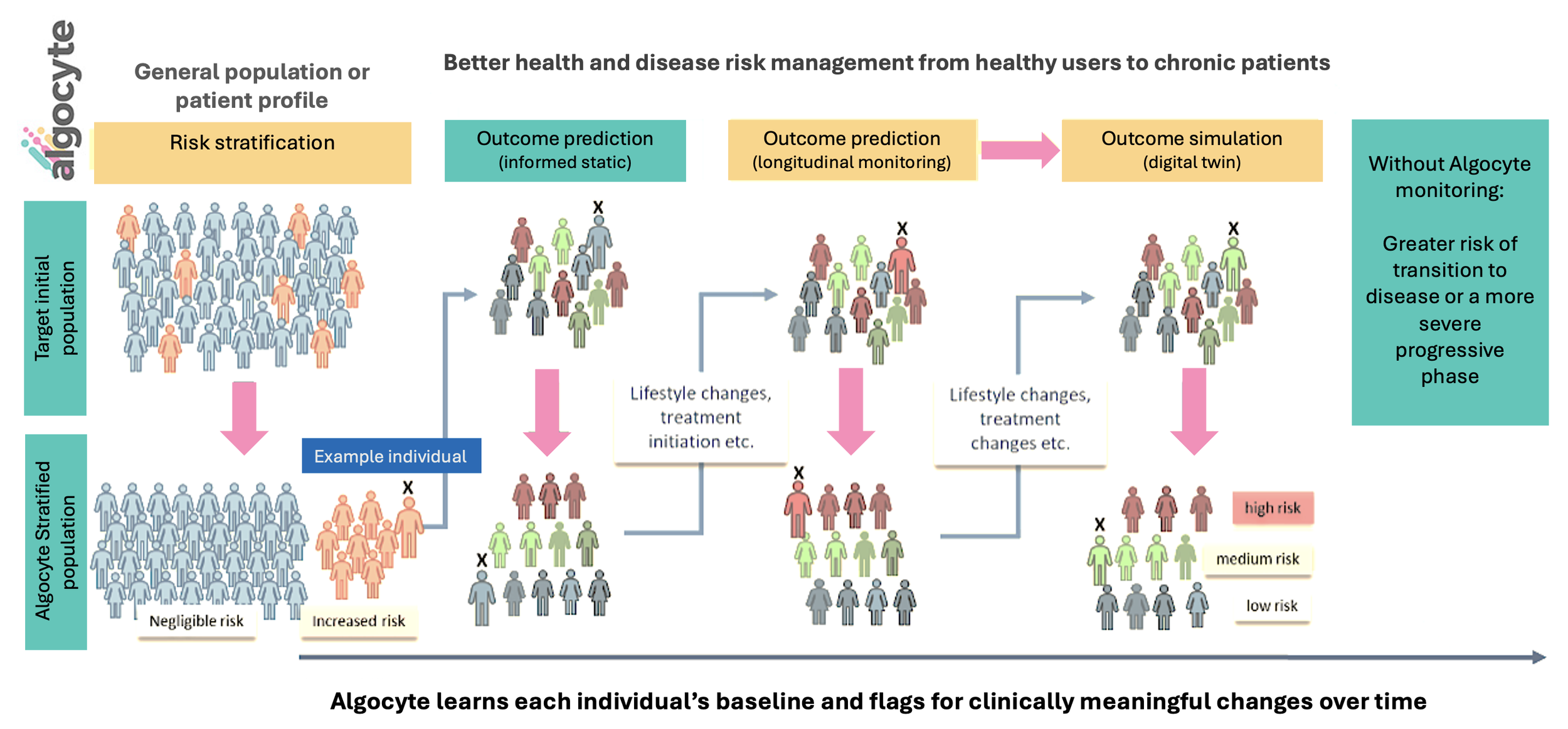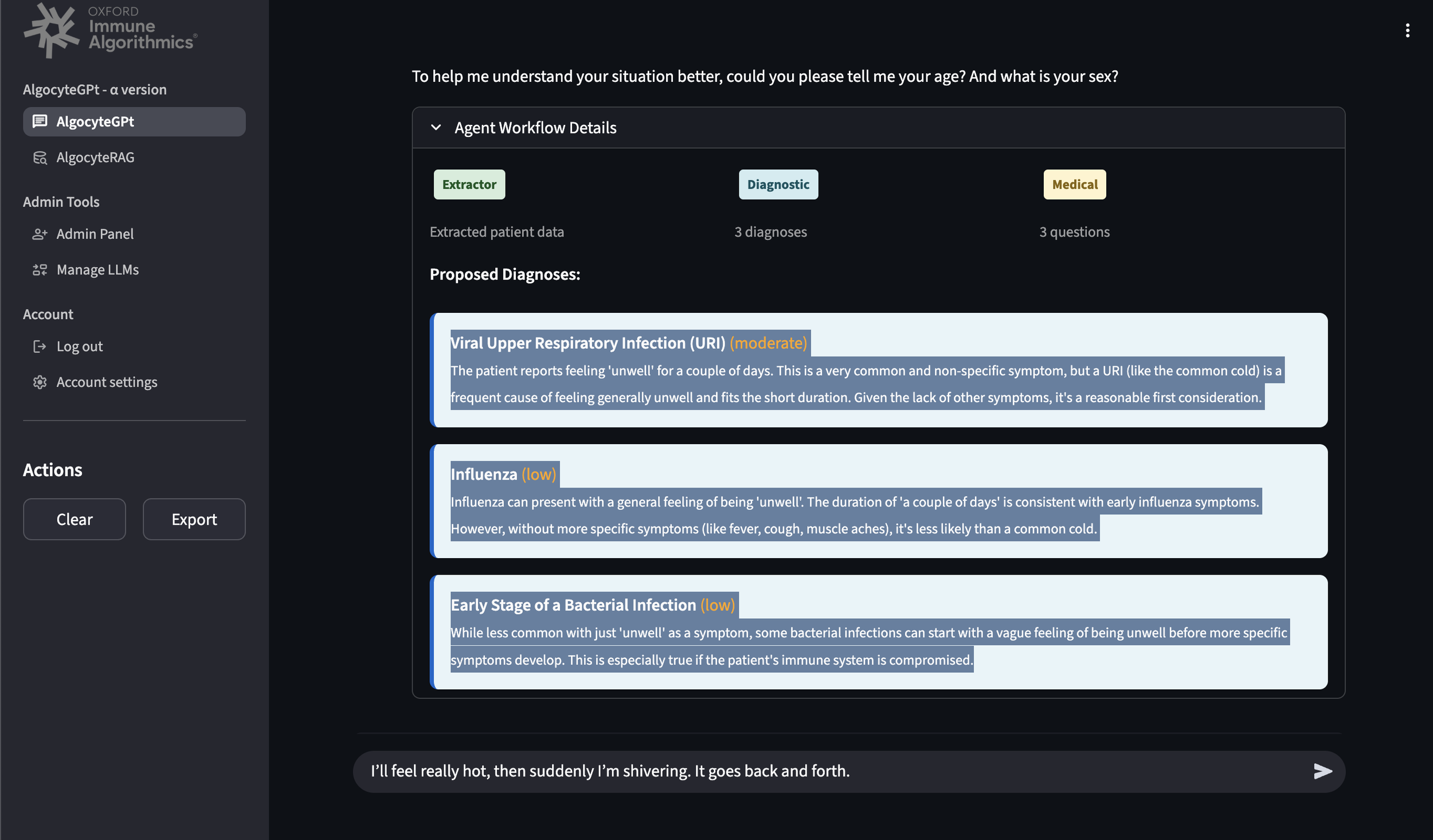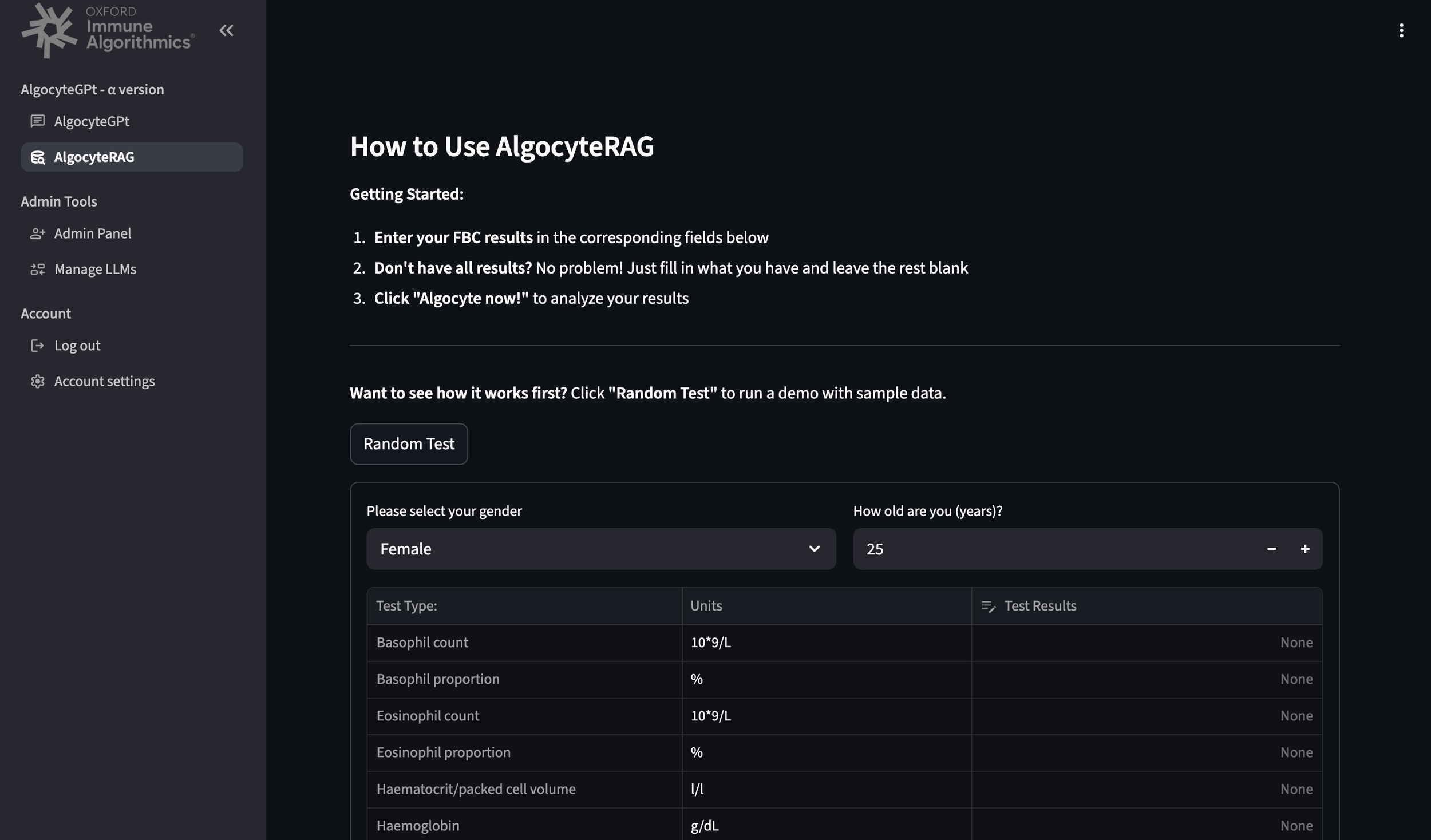
Precision & Predictive Healthcare
Powered by Artificial
Super Intelligence
The Algocyte® Modular Pathway
Powered by our proprietary Quantum Deep Learning algorithm, Algocyte is the most comprehensive end-to-end healthcare solution that enables continuous health monitoring, and an advanced early warning system, leveraging lifetime data from to support differential diagnosis and decision-making, precision healthcare, and predictive medicine
AI Meets the Immune System
U.S. Patents 11175230 & 11534751
Design registrations:
EU: 0150519220001 UK: 6349333
US: 29959215
Currently undergoing conformity assessment
Algocyte® is OIA’s flagship and only product, it enables an end-to-end highly scalable & universal preventive Health-as-a-Service (HaaS) solution for health monitoring
The data-driven beginning of the Algocyte® journey is in the collection of biological and health-relevant individual data.
The Algocyte® Mobile Health Station (MHS) is a line of minimally invasive, portable and affordable medical devices that will allow users to perform the most informative medical blood test from Point of Care or the comfort of home using a simple, mobile phone–controlled medical device with accuracy equivalent to clinical laboratory equipment currently using a CE-marked disposable glass cartridge.
The Algocyte® MHS is a versatile instrument powered by our proprietary Quantum Deep Learning algorithm inspired by the principles of mechanical statistics capable of spectroscopy, light microscopy and immunofluorescence trained using a proprietary image repository of over 250,000 individual cells. These immune cells are the cells related to most human diseases and conditions, from cancer to inflammation to infection.
The results are available immediately after testing and are securely shared with users and their healthcare professionals via the Algocyte® cloud platform.

The Algocyte® cloud platform continuously learns and refines each person’s optimal health profile through long-term monitoring
Blood testing is one of the most valuable sources of clinical and biological information about an individual’s health. Up to 70% of medical diagnoses are informed by blood testing. The bloodstream serves as the immune system’s primary channel for transportation and communication.
The Algocyte® Mobile Health Station (MHS) enables continuous learning through regular monitoring of this rich stream of information, building a personalised health baseline—or individual set point—for each user/patient over time.
Results from the Algocyte® MHS but also standard laboratories, older records captured from paper reports or new results from device screens (e.g. glucose meters), can be ingested by the Algocyte® cloud via automated text recognition from a simple photo.
Algocyte® collects clinical and lifestyle data directly through its app. Rather than relying on population averages, it integrates personal, demographic, and behavioural information with blood biomarkers to deliver truly personalised, precision healthcare.
The Algocyte® Index: a first glimpse into each person’s health
Algocyte® uses a proprietary index that distills key information from a user’s blood biomarkers into a single, colour-coded score. This index dynamically assesses individual risk based on longitudinal data collected from the user over time.
Initially tested on 100,000 patient records and subsequently validated using the UK Biobank dataset with 500,000 participants, the index has shown robust performance—even when applied to noisy data. A full description of the methodology and results is available in the index white paper.
The Algocyte® Index enables users to track and understand their personal health trends, while also providing healthcare professionals with a powerful tool for triage and longitudinal patient monitoring.
Platform v.1.0 in compliance with European Commission Directive 98/79/EC for General IVD device and UK Medical Devices Regulations 2002 and for general IVD device.
Triaging patients using the Algocyte® Index (NIS/NCCIS) has been retrospectively tested and validated on two independent cohorts: NHANES (left plot; 100,000 participants) and the UK Biobank (right plots; 500,000 participants).
In both independent cases, the index on its own reliably distinguished blood-related healthy from non-healthy individuals—even when using noisy or self-reported data. It demonstrated a high degree of sensitivity across a broad spectrum of major and granular diseases and conditions, demonstrating its robustness and clinical relevance as a first warning system for large-scale population health screening.
What Your Algocyte® Biological Age says about your health
Average biological age prediction for healthy versus unhealthy male and females based on the Algocyte® index. For healthy people the biological and chronological ages are closer than for those unhealthy, conforming to the expectation of a biological-age index.
Using the Algocyte® Index as a foundation, we have demonstrated its ability to characterise biological age.
Among individuals with healthy blood test values, the index predicted their chronological age with an average precision of approximately five years.
In contrast, for individuals with abnormal or unhealthy blood profiles, the index failed to predict age accurately, aligning with expectations for a reliable biological age predictor that reflects the impact of (un)healthy ageing.
This type of biological age characterisation from markers related to white blood cells is also called inflammaging because it is related to inflammation, one of the causes of many diseases, from arthritis to cardiovascular diseases to stroke and to neurodegenerative diseases, from Multiple Sclerosis to Alzheimer’s.
AlgocyteGPT®: A specialised LLM based on blood-driven diagnostics
AlgocyteGPt® is a multi-modal multi-source proprietary Large Language Model (LLM) that processes user data to generate personalised diagnostic hypotheses and estimates diagnostic confidence scores.
These hypotheses trigger targeted clinical questionnaires, which are reviewed and validated by healthcare professionals before being delivered to the user via the Algocyte® app.
The user then answers these questions to confirm or reject the initial hypotheses, enabling an iterative diagnostic cycle between health professional and patient/user. This process supports differential diagnosis and may suggest additional blood tests or medical investigations, facilitating a more accurate path to diagnosis, in collaboration with healthcare providers.
Left: Number of diagnostic hypotheses generated with a high level of confidence on 10,000 cases. Right: Agreement on International Classification of Diseases (ICD) between AlgocyteGPt® and a human medical doctor on a random selection of 100 out of 10,000 cases.
On the right plot, Y means full agreement while Broadly Y means that the ICD code was a subset or superset of the human medical diagnosis. This means that AlgocyteGPt® agreed with the human doctor diagnosis in virtually 100% of the cases.
Ada and Florence are our LLM models for clinical decision support as part of our AlgocyteGPt technology. Florence is a multi-agentic system that maps symptoms to diagnosis hypotheses based on ICD10 codes with confidence values. It is based on MedGemma fine tuned with deep longitudinal clinical data.
Ada, and its RAG version, are deep reasoning predictive engines enhanced with our true reasoning causal modelling engine rather than statistical inference (wrongly usually called ‘reasoning’).
Together, they offer high-quality medical interpretation of personal longitudinal blood test results, combining objective and subjective data delivering super-human fast and reliable information as no human clinical provider is able to grasp or analyse all this data in limited time and with limited resources.
Our AI models outperform the best generic and specialised LLMs in simple predictive tasks. Read the announcement and paper.
Algocyte® Database of Disease Signatures
Exploiting a (growing) proprietary repository of over 200 disease signatures, Algocyte® compares each user’s longitudinal biomarker trends against these disease patterns using advanced causal machine learning techniques with high levels of sensitivity and specificity.
The more closely a person’s unique health signature matches a known disease signature in the Algocyte® database, the stronger the system’s warning signal becomes, enabling early, personalised alerts for potential clinical action.
Examples of five expert-curated disease/condition signatures out of over 200+ Algocyte®’s growing disease signature repository. Each time series is a tracked blood marker. Algocyte detects the one moving faster away from each person’s baselines.
Algocyte®Artificial Super Intelligence for Predictive Causal Diagnostics
Algocyte®’s AI engine, benchmarked by the SuperARC test introduced by our founder, outperforms all general and even specialised LLM frontier models in both sequence prediction and model abstraction, including all the frontier models from OpenAI (ChatGPT), META (Llama), Claude, Mistral, Antrophic, Gemini, Qwen, DeepSeek, Grok, etc.
At its core is BDM/CTM, a causal‐discovery framework foundational to Algorithmic Information Dynamics as introduced by OIA’s founder at Oxford and Cambridge, that ascends to the top rung of Judea Pearl’s Causality Ladder by combining perturbation analysis with algorithmic information theory.
This capability enables intervention analysis on simulated health trajectories, empowering users to make better‐informed decisions.
Figures from our white paper available here; code, data and leaderboard available here show how Algocyte®’s AI engine outperforms the most powerful LLM frontier models at model abstraction (for explainability and traceability from first and mechanistic principles) and prediction. Our method is the one marked ‘CTM/BDM’ and is an ‘ASI’ universal (Super Intelligent) AI model. For more papers, visit the Science section.
Algocyte®’s Artificial Super Intelligent (ASI) engine opens windows of opportunity of predictive value for super-early detection through regular monitoring, identifying a wide range of diseases and conditions—from broad categories to fine-grained subtypes, depending on the individual patient and context.
In these plots, it is shown how and when we may tell apart various data-driven disease pathways including early detection of cancer demonstrated retrospectively using the UK Biobank data set (a subset of 500,000 participants with incident or prevalent cancer) both by divergent gaps from different initial conditions or change of blood marker trends predicted by the ASI engine.
Beyond pattern-matching: Algocyte® Causal Disease Networks
An example of a causal disease network for Microcytic anaemia from which a Digital Blood Twin is built and on which perturbation analysis is possible for generating counterfactual disease hypotheses of future states (simulating possible interventions).
With the wealth and depth of data collected over time, the Algocyte® Causal module can uncover new insights into disease progression, and its predictive models become far more accurate.
From biomarker time-series data and their projections, Algocyte® builds disease networks of correlated analytes that are converted into causal disease networks by adding inferred common causes, each of which is queried against and validated by medical knowledge and clinical guidelines.
Source-agnostic: User medical data from multiple sources: printouts (OCR), lab (HL7), and other compatible devices (both from clinicians and patients enriched with lifestyle data for clinician-oriented hypothesis generation
Data Merging Aggregator
Dynamic Hypothesis Generation for Differential Diagnosis
Designed by their health professionals supported by guardrailed Generative AI to capture adverse events from patients at testing time or any other time and aligned with medical guidance and healthcare pathways
Learns from the user’s personal and clinical behaviour over time and builds a profile with personal baselines. Generative guard-railed AI is used for diagnosis discovery and differential diagnostic support by creating prompts aligned with medical guidance
A Digital Blood Twin
Delivers on the promise of early detection and personalised medicine by harnessing currently available and most popular medical tests, making them accessible for regular and remote monitoring
An Early Warning System
Tested against a sample of hundreds of thousands of real clinical cases, it separates healthy from non-healthy cases using regular blood test markers (even in the presence of significant noise)
Health Consumer Triaging
ISO 27001 Certification. Compliant with medical regulations and data privacy and governance guidelines including GDPR and NHS DSP.
Private & Secure
Coined by OIA’s founder, causal diagnostics is a responsible, cutting-edge model-based approach to medicine that differs from simplistic AI-powered approaches that are based on traditional statistical methods ill-equipped to deal with multifactorial complexity.
Two-way meaningful communication capabilities between user and health professional to match symptoms and adverse effects to medical results thereby enriching and cross-referencing lab tests with physiological data and subjective feeling.
OIA are pioneers in Artificial General Intelligence applied to complex cell and biological data. AGI is a type of AI that mimics human reasoning enabled by a combination of cutting-edge symbolic and neural computation that relies on both human mind-type processes and machine intelligence.
Minimally invasive, PoC or at-home, regular, precise, and cost-effective health monitoring enabled by portability, simplicity, and affordability contributes to democratising healthcare and eventually delivering standard of care to everyone.
Watch our Chief Medical Officer, Prof. Kourosh Saeb-Parsy, an international multiple-organ surgeon (NHS) discussing with our SAB member Prof. Petter Brodin, one of the world leaders in systems immunology research why longitudinal monitoring and understanding is key to understand the transition of health to disease.
The future of health care
Design registrations:
U.S. No. 29/855,827 UK 6201272 & 6201273, 008931349-0003 & 008931349-0004
Algocyte® applies algorithms for personalised medicine to monitor the immune system and blood-related conditions based on blood testing.
Algocyte-compatible device
AGI enables low-cost instruments for a fully scalable Health-as-a-Service model.
Agnostic platform with universal integration
Capable of transferring files through and from our cloud APIs, LIMS and EPRs
Assay integration by helping design the cartridge and software plug-in to implement any test
Two-way communication that helps with drug adherence and creates a better clinician-patient relationship
Captures multiple users’ health data and lifestyle from any source
Health-as-a-Service model that creates loyalty based on value
Directs clinically-driven questionnaires to users to collect and cross-reference multiple data
Can learn and build each person’s personal health database
First commercial multi-omics patient-oriented platform
Advanced predictive capabilities (award-winning engine able to predict the continuation of time series and complex medical models)
Agnostic Superintelligent platform
A more efficient and timelier, medically-driven, supportive remote patient monitoring system
A visual dashboard and individualised smart report for patients
Analysis of trends based on proven scores and patient’s personalised baselines
A reduction in hospital/clinic visits and infection risks, keeping patients in their homes
Helps find the optimal balance in treatment cycles between efficacy and tolerance
Enables clinicians to deliver regular contact and care to patients
Relieves clinicians of time-consuming tasks. In an independent survey conducted by the NHS, doctors, and nurses said they could save up to 2-3 hours a week each by using Algocyte’s automation tools
Health bottlenecks that Algocyte® can help unblock and optimise
Oncology patients require frequent blood monitoring during treatment. This is highly disruptive for patients and their families, particularly for children.
Some patients can now have their treatment at home (e.g. oral chemo) but must still travel to have their blood tests done.
Adding to their stress, patients may not know if their symptoms are the result of the therapy affecting their immune system or a serious infection that must be addressed immediately.
Health professionals also struggle to access timely and precise health information to be able to schedule the next individualised therapy cycle, having to wait while testing appointments are scheduled, and then for the results.
Oncology
Community health workers around the world, both in developing and developed countries, are key agents who assist in decreasing the global burden of disease and treatment in the communities they serve.
They help collect and store blood samples that they bring to labs to run the required tests, but they are prevented by distance and by time constraints from doing more.
On the one hand, one of the challenges of community health workers is to strike the fine balance between maximising coverage and minimising haemolysis as a result of storing and transporting these samples.
On the other hand, health professionals often have to wait for hours or days to gain access to the patient’s results after samples are taken to the lab, which make it a suboptimal process and a healthcare bottleneck.
Community nursing
For those individuals living in retirement and nursing homes, regular personalised health monitoring and blood sampling are important components of their everyday lives, essential to their continued health and longevity.
Their health allies can help them monitor themselves while keeping their health professionals, and even their families, updated in real-time on a regular basis, even from remote locations.
The Algocyte solution can be delivered where and when they need it, without their having to leave the comfort and safety of the facility. This, while learning from and building their optimal health profile from personalised and precise access to their health, allowing them to enjoy their lives with minimal interruption, and preserving, as much as possible, their way of life.
Retirement & nursing homes
Health & wellness awareness
Health and wellness awareness dates back centuries and is very relevant today because people empowered by science and technology are able to make personal decisions, intervene, and make a difference.
We are entering a new era of health consumers with unprecedented access to health information and a diversity of choices available to help them live longer and healthier lives.
Clinical literature now supports more frequent blood monitoring, even in healthy individuals, to establish their health status before the onset of disease.
What if there was a better way for all these users, patients, and their families to solve health and disease-related challenges?
The solution is Algocyte®.
Disclaimer: All software modules and devices shown are in different stages of development or conformity assessment
Want to find out more?
In our downloadable PDF, we share the in-depth science behind our breakthrough product. Delve into the specifics of our leading immune system monitoring platform.























